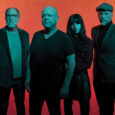REAL BANDS…WELL, THEY PLAY MUSIC AND THEY RECORD ALBUMS
A CONVERSATION WITH JOEY SANTIAGO & DAVID LOVERING OF THE PIXIES
It feels strangely surreal to still be interviewing the Pixies about new music in 2024 – it’s a credit to them that, long after their original run ended, and 20 years-plus into their reuniting, they’re still pumping out eminently listenable and nuanced records.
Joey Santiago, the band’s guitarist, describes it best: “When we first reunited, we played a bunch of shows, but after a while, you want to feel like a real band. And real bands…well, they play music and they record albums. So, it’s a sensible thing to do, and a thing we like to do. I like the sense of accomplishment, and we like making records…painful though it may be!”
It’s hard to pick up on any pain that’s visible on their newest effort, The Night The Zombies Came, which released on Oct. 25. Such is the band’s exploration of macabre themes and seemingly well-tied together songwriting that the question arises almost immediately as to whether this is that dreaded musical conceit, a ‘concept album’, something which would seem to be almost too straight-laced for rock’s purveyors of opacity. As expected, Drummer David Lovering quickly shoots that idea down, explaining that although the album was recorded last year “around Halloween…I don’t think it’s a concept album. Charles just had a bunch of songs, and they kind of lend themselves to that spooky thing”.
Of the album, Lovering talks firstly of the serendipitous nature of the recording process, but also speaks glowingly of their musicianship. “We didn’t really plan this album, but we just had a little free time, and when we went into the studio…well, we’ve been doing this a long time, but on this album, I think we all played exceptionally well.”
He also expands on his lauding of producer Tom Dalgety, who he has described elsewhere as ‘The Fifth Pixie”, saying: “He knows how to elicit the best out of us, and he gives us a comfort level that allows us to be open to him giving us ideas and inspiration. It’s our fourth album with him, and it works so well.”
Despite the familiarity, they’re not averse to trying new things either – a discussion with Santiago on one of his contributions to the new record, the lyrics on “Hypnotised” sees him describing the process of writing in sestina, a form of poetry that originated in the 13th century. Never let it be said that writing about music can’t be educational! While it could’ve been a challenge too far for some, Santiago grasped it with both hands, saying the restrictive nature “kind of narrowed my road…focused me on a certain structure. I think having rules narrows your path into a more focused place.”
The other new aspect on this recording is the band’s new bassist, Emma Richardson, who joined the band this year after the departure of Paz Lenchantin. It didn’t take long for Richardson to make her mark, as her backing vocals and crunchy basslines are all over The Night The Zombies Came, but both Lovering and Santiago are effusive in their praise of the newest Pixie. Lovering, her rhythm section partner, probably sums it up best: “She’s a great player, great singer, and her voice is fantastic. She’s elevating me, because I’ve got to step up what I’m playing just not to be embarrassed!”
Her first assignment with the band was, of course, this year’s celebrated tour playing the songs of Bossanova and Trompe Le Monde, aka the two later albums from the band’s original run. For a band who, per Lovering, don’t normally play with a setlist, this certainly presented something of a challenge, although Lovering also says that playing with structure was interesting, grounding them and giving a sense of time. There’s also the challenge, of course, of playing many songs that haven’t been heard in a while – when I reference that, despite seeing the band on multiple occasions, I still heard things I hadn’t heard before, Santiago cheekily remarks “We hadn’t heard them either!”, referencing “Space (I Believe In)” from the latter album as one that hadn’t been played “since the record button stopped!”
Perhaps one of the hardest working reunited bands in the world, I catch up with them just as they are preparing to play their final two shows on the current tour. They’re about to play Manhattan here, speaking to me from their hotel room before rounding off in Boston at the end of the week. That’s not the end of the tour though, as they’re about to play a number of dates in New Zealand and Australia with 90s compatriots Pearl Jam, before embarking on a tour to support The Night The Zombies Came in 2025.
Somehow, the ride keeps on turning, and when trying to probe on why, Lovering possibly has the key to it. “When we first came back in 2004, there was a sea of kids who knew our songs that weren’t even born when we initially recorded them. Now, 20 years later, it’s still a younger audience, and interestingly, they know all the new material, which is different to someone my age, who might still remember our initial albums the most.”
It’s true – there’s something about this band that seems to be evergreen, and in an era of cash-grab reunion tours, it’s refreshing to see a band cultivating new fans and also pushing boundaries sonically. As they release the sixth album of their second act, there’s no sign that generations more people won’t be following the band as they continue to find new things to say, and with their maturing, evolving sound, I suspect this may not be the last time we hear from them about yet more innovations.
One senses that the band is really enjoying their creative process – our chat is full of smiles and laughs, and perhaps the final word goes to Lovering, who’s sheer joy at being in the band and being a Pixie radiates through the screen, and perhaps his words sum up how the fanbase feels at still hearing new music long after they could’ve reasonably expected to: “We’re very, very fortunate.”











